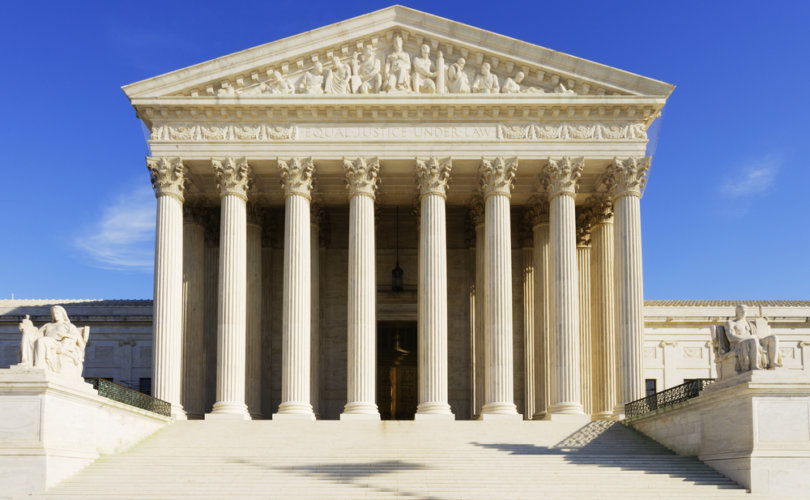April 6, 2016 (CardinalNewmanSociety) — The U.S. Supreme Court is seeking alternatives to the HHS contraception/abortifacient/sterilization mandate that would provide coverage for these services while preserving religious freedom, and Catholic colleges involved in challenging the mandate are preparing to respond.
“There are numerous ways for the government to preserve religious freedom without forcing contraceptive coverage on objecting religious organizations and colleges,” Thomas Aquinas College (TAC) legal counsel Quincy Masteller told The Cardinal Newman Society, noting that the Supreme Court justices may now be recognizing the moral dilemma facing religious organizations and colleges.
Last week, the Supreme Court made an unusual request, asking both the government and religious organizations to submit additional briefs exploring possible alternatives to the mandate. The alternatives, according to the Court, should spare religious non-profit organizations from performing any role in providing objectionable coverage while also assuring that those services are available to employees through other means. TAC, in conjunction with the other co-plaintiffs in HHS case, will be filing a supplemental brief in the coming weeks in response to the U.S. Supreme Court’s latest order, Masteller confirmed.
TAC in Santa Paula, Calif., and The Catholic University of America in Washington, D.C., — both recommended as faithful Catholic colleges in The Newman Guide to Choosing a Catholic College — are co-plaintiffs challenging the HHS mandate, along with a number of other Catholic institutions. A total of seven cases challenging the mandate were consolidated in Zubik v. Burwell, most notably the Little Sisters of the Poor’s case. The mandate forces employers to cover contraceptives, abortifacients and sterilization procedures in their employee health plans regardless of religious objections. Even without any religious objections, large corporations such as ExxonMobil, Pepsi and Visa are exempt from the HHS mandate while religious organizations have been threatened with severe and crippling fines.
Although the controversy has revolved mainly around religious non-profits such as the Little Sisters of the Poor, it will also affect students at religious colleges. Yet any reference to students was absent from the Court’s order, the website SCOTUSblog pointed out.
“The new order contains no reference to students and their access to contraceptives,” the SCOTUSblog post noted, “but it is unclear whether that was an intended omission and, if it was, what differences might have to be arranged for colleges as to their female students.”
It would not be difficult for the government to protect religious organizations and colleges if it wanted to, Masteller told the Newman Society.
Click “like” if you are PRO-LIFE!
“The government could, for example, extend the currently very limited religious exemption to include all objecting religious institutions,” he said. “The government could also offer a cost-free contraceptive coverage plan on the Obamacare exchanges where interested employees can obtain this coverage without involving the religious institutions.”
Senior counsel David Cortman at Alliance Defending Freedom, which is involved in two of the consolidated HHS cases, spoke with the Newman Society and hammered the government’s supposed “accommodation,” which he argued still forces religious objectors to complicity provide objectionable coverage.
“The government is forcing our clients to offer access to abortion-inducing drugs through their insurance plans. That is no accommodation,” Cortman told the Newman Society. “There is an easy solution: The government can offer these services to women who want them without forcing Christian schools, nuns, and priests to abandon their belief that life is sacred. We will confer with our clients to determine a response to the Supreme Court's request.”
All new filings for the case must be submitted by April 20, in the midst of the Court’s final hearing schedule. The Court made no mention of a new hearing in its order, yet could still call for a new hearing if it wished, according to SCOTUSblog. As it stands, a decision is expected in June.
Reprinted with permission from The Cardinal Newman Society.

